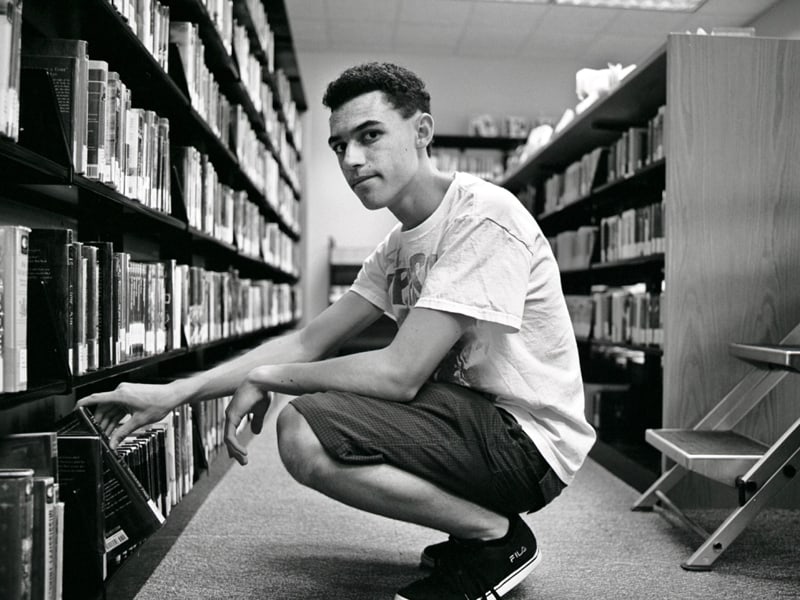Being prepared for year 11 – which in Australia means senior high school – feels almost as daunting as getting your five-year-old ready for ‘big school’. Only this time the school is actual big school and your five-year-old is HUGE.
My son starts year 11 in three weeks time. I was actually quite surprised by how important the transition to year 10 to year 11 has felt as a parent.
I mean, I assumed that Max would be feeling it. He selected HSC subjects towards the end of year 10 as part of preparing for year 11, and that was quite the punch in the guts.
Shit suddenly got very real.
As for me, there’s a real sense of my ‘baby’ is growing up. I feel that more so than ever before. The sensation of ‘running out of time‘ to raise him into adulthood is my own ‘shit got real’ moment.
Max, on the other hand, is remarkably chill about the whole thing. Mainly because I don’t think he has any idea what’s in store for him (despite his school doing everything right to get the message through!). I reckon there’s a meltdown in his future in about week 2 of year 11… sound familiar?
Here are some tips to make the transition into year 11 a bit smoother for both yourself and your teen. And do remember, being prepared for year 11 isn’t the end of the world BUT, it does mark the beginning of the end of school… yikes.
6 tips for getting prepared for year 11
1. Uniforms
Many schools have a different uniform for seniors in year 11 and 12 (sometimes senior school includes year 10, so your teen may already be kitted out). If you haven’t already, make sure your senior has their new uniform ready to go on day one. They might think they won’t mind continuing to wear the junior uniform… until they rock up first day and they’re the only one.
2. Subject choices
Getting prepared for year 11 usually starts in year 10 at most high schools. Subject choices are already made, but they may not be locked in. If your senior has had second thoughts about their choices over the holidays, first day back is the right day to go and see their year adviser to discuss options.

Often the school timetable and class sizes can accommodate some last minute changes, but it’s not infinite. If you want to make a change, be first in line.
This is especially important if your child has a particular university and degree in mind that they are aiming to get into. They need to make sure they are studying all the necessary subjects and talk to their adviser about getting into the correct classes.
3. School structure
At many schools, year 11 is structured quite differently to years 7-10. Your child will have learned about any differences when they were in year 10, but it’s worth reminding them to check in. This is especially relevant if your school is one like ours that offers classes outside of school hours. An earlier start than the school day is worth knowing about before day one!
Teaching the senior year also relies on students doing more independent learning.
It’s no longer enough to simply show up to class or even get the homework done.
Practising and revision at home is essential, as is extending their learning in key subject areas beyond the classroom. Teachers will, of course, assist with this, but it pays to be aware that out-of-class learning is not just expected, but mandatory.
Remember, too, that year 11 is only three terms. Year 12 starts in term four of the year 11 school year… so there’s plenty to fit into a mere three terms.
4. Workload
There’s no doubt about it, the workload increases substantially from year 10 to year 11. Students are expected to learn more in a shorter period of time. The faster pace of learning means it’s easy to fall behind if you aren’t prepared.

This means that your child’s commitment and organisation capabilities (see below) will be expected to increase as well. Talk to your teen about their expectations and how they think they will manage the extra load. Ask them what steps they will put into place to ensure they keep up and what they would do if they found they were falling behind.
It’s worth reading through the subject curriculum for each of your child’s subject choices. You can find the curriculum for each subject on your state’s education page.
5. Organisation
The extra workload, expectations and seniority at school means that our kids need to sort themselves out and quick! It’s time to bring out all the organisation and time management tools you can muster and get them into a routine. Forming good habits from the start is an essential part of being prepared for year 11 and beyond.
Tips for newbies are still relevant in year 11: 21+ tips from teachers to get organised at high school
A (paper) calendar, prominently displayed, is a good starting point, backed up by their digital calendar. Paper is important because writing things down helps them stick in our memory. Setting weekly and monthly goals using the calendar can help your child stay on track and up to date.
It will also pay to try out and master some good study techniques.
6. Anxiety
There’s an epidemic happening right now, and it’s not just coronavirus. The pressure that society, most schools and, yes, so many of us parents put on senior high school kids is frankly ridiculous. It’s caused a noticeable ramping up of diagnosable anxiety in our young people.
We must do better: Our teens are in crisis and they need our help
We are failing our kids in this way and it’s imperative that we support them emotionally, mentally and spiritually throughout their senior years. Teens need to know that high school results are not the end of the world, nor even the beginning. Senior high school is just a very small part of their overall life.
Preparing for year 11 means encouraging them to enjoy these last years of ‘babyhood’, while we support them to do the best they can.
Do you have a year 11 starter? How are you feeling?
Feature image by Siora Photography; library stacks by Adam Winger; writing by Green Chameleon

